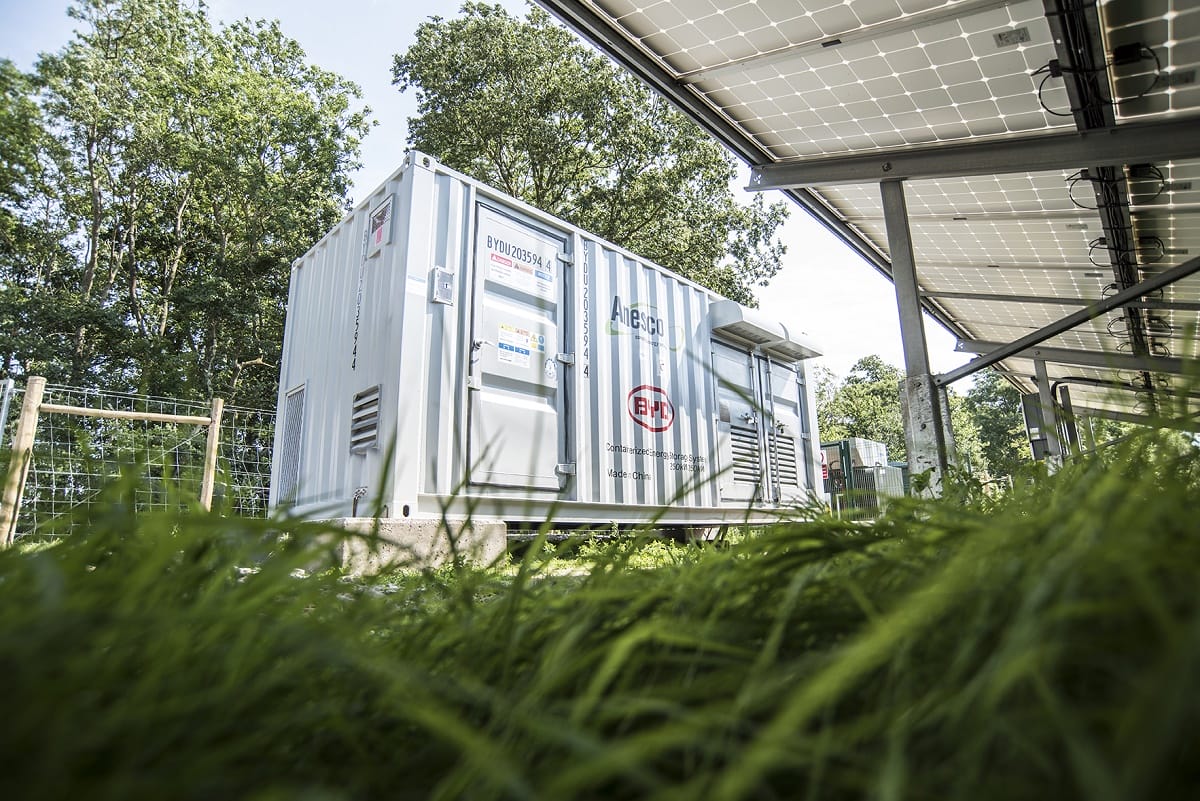Thornton Le Moors Hybrid Solar and Energy Storage Project
Anesco Limited is proposing to develop, construct, and operate a 50MW Energy Storage and 20MW Solar Project on approximately 168 acres of land, located at Cryers Lane, Thornton-le- Moors, Chester West, CH2 4LH.
This development will support the UK governments pledge to end its contribution to global warming by 2050, benefitting the local and wider community now, and for generations to come.
The land at Heath Lane is suitable for a Battery storage facility because:
- It is close to a viable grid connection
- Has suitable topography and ground composition
- Is not location within an area of Natural Beauty
- Sits outside any areas of special scientific interest
- Is well screened by nearby trees and hedgerows
Furthermore, it is anticipated that additional planting and hedgerow re-enforcement will be put in place that will be managed throughout its lifespan.
Pre application advice has already been sought from Cheshire West and Chester Council. Alongside this, an Environmental Impact Assessment (EIA) screening request has been made and determined by the council, resulting in the development not requiring an EIA.
PLANS
FEEDBACK
This is your opportunity to provide your thoughts and any suggestions you may have for us. Please email the following address to share additional feedback:
Please provide any comments by 15th July 2025
PROJECT BENEFITS

Clean green technology

STORING A CAPACITY OF 50MW
saving over 4,433 tonnes of co2 per annum

powering approximately 7,300 average uk homes
System design details
Total installed capacity: Solar: 130.39MWh
Batteries: Hithium- Power Generating Facility registered capacity 105.4MW
Transformers: 3 x 33KV

Climate change emergency
In June 2019, the UK government became the first major economy in the world to pass laws to end its contribution to global warming by 2050. What this means is that by this date, the UK’s greenhouse gas emissions will be carbon neutral, creating a better environment now, and for generations to come.
Carbon neutral is about finding a balance between the total greenhouse gas emissions being produced, and the total emissions being removed from the environment. This commitment to becoming carbon neutral is a substantial increase on the UK’s previous target and comes at a time when pressure is building on governments to recognise and take urgent action in light of the climate emergency.
About solar technology
Solar is the most popular renewable technology in the world and is an incredibly clean source of renewable energy. Unlike other renewable technologies, solar panels have no moving parts and therefore operate silently. They are also low in height and can be hidden behind hedgerows or fencing, minimising the visual impact on the landscape.
Biodiversity enhancements
The RSPB ‘State of Nature Report’ highlights the severity of the decline in British wildlife. It details that of the 8,431 species that have been assessed using regional Red List criteria, 15% have been classified as threatened with extinction from Great Britain. Climate change is driving widespread changes in the abundance, distribution, and ecology of the UK’s wildlife, and will continue to do so for decades or even centuries to come.
Solar farms present an excellent opportunity for biodiversity. The proposed solar farm will be installed on piles with minimal disturbance to the ground. The solar panels have no moving parts and the infrastructure typically disturbs less than 5% of the ground. The posts upon which the panels are mounted take up less than 1% of the land area. Because panels are raised above the ground on posts, more than 95% of a solar farm field area is still accessible for plant growth and potentially for wildlife enhancements. The proposed solar farm would have a lifespan of 40 years which is sufficient time for appropriate land management to yield real wildlife and biodiversity improvements within the local area.
A site-specific biodiversity plan will be devised to cover the lifetime of the proposed solar farm, working closely with the ecologists, and conservation organisations to ensure that the biodiversity enhancements are most appropriate to the local area.
FREQUENTLY ASKED QUESTIONS
How long will it take to construct the BESS project?
Construction Period 36-40 weeks (Daily 4 Lorry Vehicles) Following construction there will be x2 vehicles a day on two occasions each month for operational purposes.
Does battery storage make any noise?
Only the cooling system of the ESS generates any noise, an emission of less than 66db at 1m from the unit. The noise dissipates rapidly from source and should not be audible outside of the field boundary. The development undergoes a noise assessment to ensure any noise made is below the ambient noise of its surroundings particularly during the quiet night-time period.
Is battery technology safe?
The Lithium-Iron Phosphate battery modules – a well-established battery technology found in a huge range of electrical devices – are in sealed containerised units which are safe to use, providing long life.
How will the site be accessed?
Access will be from the East of the development site.
Does battery storage require a lot of maintenance?
Anesco have grown to become one of the largest providers of maintenance for renewable assets in the UK and our specialist service currently manages over 21,500 systems. Anesco would monitor and maintain the site for the lifetime of the project with under contractual obligations. Once operational, there will be a visit by Anesco every 21 days for maintenance/survey purposes.
What happens at the end of the 40 year term?
The proposed development would be a temporary structure for a duration of 40 years after which the site would be returned to its current condition with all equipment removed.

Creating a better future
Download your free guide to find out why we need renewable energy.


